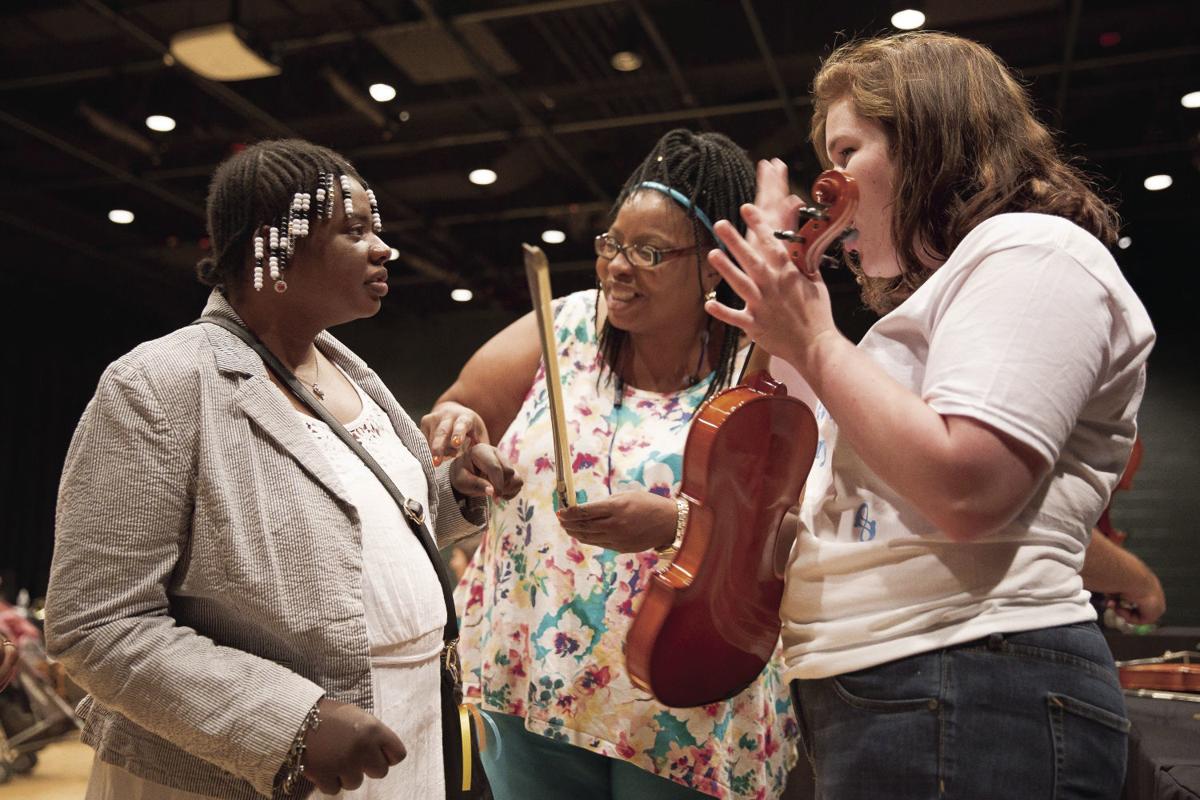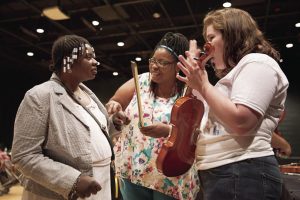
In fall 2017, the Philadelphia Orchestra presented its first-ever full orchestra sensory-friendly concert at the Kimmel Center for the Performing Arts. The concert features a no-shush policy, lighting adjustments, cool-down spaces, trained helpers and both planned and impromptu interaction between musicians and audience members.
Autism disorders strike one in 100 children, according to U.S. government estimates. Children with the diagnosis are often sensitive to loud noises and harsh lights, and find it hard to sit still or remain quiet. Autism spectrum disorders include both severe and relatively mild symptoms.
The region’s expanding sensory-friendly offerings have been spearheaded, in part, by Roger Ideishi, program director of occupational therapy at Temple University. An advocate of experiential, community and service-based learning, Ideishi has worked to provide community access and opportunity for children with diverse sensory and cognitive abilities.
Visit Philly provided a list of area venues and groups that have recently expanded their sensory-friendly programming that include the Philadelphia Zoo, Please Touch Museum, the Pennsylvania Ballet and Philadelphia Orchestra.
The Academy of Natural Sciences of Drexel University — Philadelphia’s dinosaur museum offers children with autism and their families exclusive Access to Science six Saturday or Sunday mornings (9-11 a.m.) per year. For these occasions and any day, visual, easy-to-follow pre-visit Museum Stories help prepare visitors of all developmental abilities for exploring the museum. Sept. 23, Oct. 20 and Dec. 28. 1900 Benjamin Franklin Parkway, (215) 299-1060, ansp.org
Adventure Aquarium hosted its first sensory-friendly event last month by adjusting the lights and sound levels at the already largely dimly lit venue creating a relaxed setting for all visitors. For more information, visit adventureaquarium.com.
The Brandywine River Museum of Art opens three times per year for free Sensory-Friendly Saturdays. Registered families receive pre-visit social stories and enjoy hands-on activities, along with support from experienced volunteers, fidgets, noise-cancelling headphones and sensory break areas. For more information, visit brandywine.org.
The artifact-filled Penn Museum offers a sensory-friendly map that highlights quiet, dimly lit and dimly lit and quiet spaces among the galleries, along with a customizable visual schedule, a planning tool. On select Saturday mornings, Archaeology in the A.M. events open the museum early to teens and young adults with developmental or intellectual disabilities with multisensory activities: craft stations, music-making, ancient games, interactive gallery tours and a dedicated quiet space with dimmed lights and fidgets, all free with admission. For more information, visit penn.museum/visit/accessibility
The Philadelphia Zoo worked with the Center for Autism Research at the Children’s Hospital of Philadelphia to create KidZooU, a hands-on, child-centric exhibit that uses the Universal Design concept to offer an inclusive, enriching experience for children. Pre-visit materials, including a picture-exchange system, are available on the zoo’s website. For more information, visit philadelphiazoo.org.
The Please Touch Museum in West Fairmount Park has dedicated quiet spaces, and staff is trained to help all kinds of kids, including those who’d like to borrow sound-reducing headphones. For programming information, visit pleasetouchmuseum.org.
The Kimmel Center for the Performing Arts offers its very first Broadway Philadelphia sensory-friendly production of Dr. Seuss’ How the Grinch Stole Christmas! The Musical on Dec. 22 (full run of show: Dec. 19-29). The morning setup includes relaxed house rules, designated quiet areas, trained staff and Art-Reach volunteers and sensory-friendly kits (noise-cancelling headphones, weighted bean bags, fidget toys). Audience members are welcome to bring their own sensory-friendly stress relief devices and move about as they wish. For more information, visit kimmelcenter.org.
The Pennsylvania Ballet offers its sensory-friendly performance of the popular “George Balanchine’s The Nutcracker” on Dec. 27. The theater adjusts sound and lighting and relaxes its rules—free movement and expression are welcome—and adds a quiet space and gluten-free concessions. For details, visit paballet.org/season-tickets/sensory-friendly-performances.
The Philadelphia Orchestra’s “Sound All Around” sensory-friendly concerts are held on the comfortable carpet of the Academy of Music ballroom. Upcoming Saturday edition of these popular, intimate performances are: Sept. 15, Oct. 20, Dec. 1; March 2 and April 6, 2019). For details, visit philorch.org.
The Philly POPS will host a sensory-friendly performance of its winter holiday concert on Dec. 5 with a judgement-free environment, mid-level sound and light, trained staff and break space and fidget devices. For more information, visit phillypops.org/sf.
The Associated Press contributed to this report.
This original news and image credit to The Philadelphia Tribune


